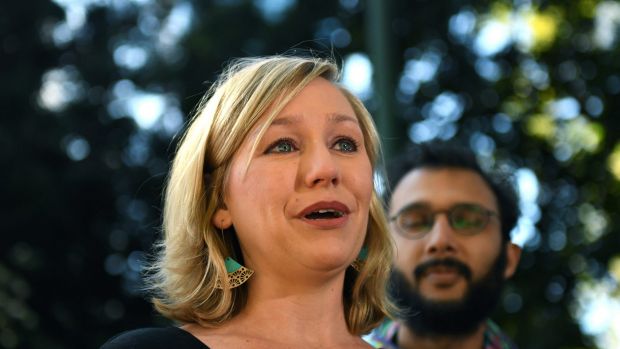It was Roman Emperor Marcus Aurelius (well before Russell Crowe in Gladiator) who said, "What we do now, echoes in eternity." How right he was. A few simple words written 120 years ago are ringing through our political landscape today; Section 44 of our constitution has seen the removal of two senators in the last week.
As ex-Greens senators Scott Ludlam and Larissa Waters will ruefully tell you, Section 44 disentitles a person who is "under any acknowledgment of allegiance, obedience, or adherence to a foreign power, or is a subject or a citizen … of a foreign power" from standing as a candidate for parliament.
More National News Videos
Larissa Waters resigns
The deputy Greens leader becomes the second to resign in less than a week.
Does anyone seriously imagine Ludlam kept a secret allegiance to New Zealand? And Waters was simply born in Manitoba; her Canadian citizenship a simple accident of her parents' careers and local laws.
What makes things more perverse is that to be an MP in New Zealand you need only be a citizen, enrolled to vote and have lived there for three years. In Canada the Charter of Rights and Freedoms states that every citizen has the right to sit in Parliament. So in three years Ludlam could potentially be an MP in Wellington, while Waters could sit in Ottawa next to Justin Trudeau.

Quaintly, it's only parliamentarians who are saddled with this cumbersome restriction. Other powerful positions in society are open to all. So the CEO of our biggest company, the Commonwealth Bank, is a New Zealander. And huge slabs of our media are owned by an American.
For a modern democracy we have a highly undemocratic Constitution, thrown together in an age before there was one single motor vehicle on our roads.
Indeed, Australia in the 1890s was in crisis. The boom years were over. Investment dried up. Banks crashed. Unemployment soared. Japan, Germany and France were getting stronger in the Pacific and at home there were flashpoints of bitter sectarian feeling between Protestants and Catholics.
Amid this backdrop, the Australian colonies were debating what sort of country they might become. Children of their age, our founding fathers were primarily concerned with the possibility that members of parliament may, especially during wartime, hold loyalties to an enemy state.

But today about 6 million Australians are dual citizens, or entitled to take up dual citizenship. None can run for Parliament unless they formally break with their heritage. They are in that regard, second-class citizens.
How could we change a law that's rooted in 19th century xenophobia? We know how hard it is to amend the constitution. That leaves one last resort – the High Court, whose role is to interpret the meaning of our laws.

In 1992 the court said the test was whether a person had taken "all reasonable steps" to renounce the other nationality. Mary Gaudron, the first woman High Court judge, took the best view, suggesting that becoming a naturalised Australian itself involved a renunciation of a past allegiance and moreover that the court should set a very high bar in removing a person's democratic right to stand for Parliament.
The court should carry on Gaudron's work and view our constitution through the prism of our modern vibrant pluralistic society. What we don't need are anchors from the past holding us back when we should be sailing resolutely forward.
Duncan Fine is a lawyer and commentator.















3 comments
New User? Sign up